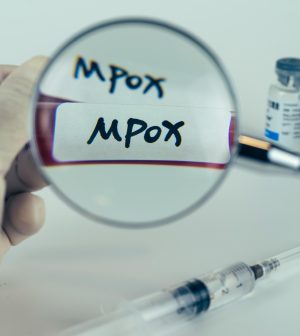- The Long-Term Effects of Daily Turmeric Supplements on Liver Health
- Could Your Grocery Store Meat Be Causing Recurring UTIs?
- Are You Making This Expensive Thermostat Error This Winter?
- Recognizing the Signs of Hypothyroidism
- 10 Strategies to Overcome Insomnia
- Could Artificial Sweeteners Be Aging the Brain Faster?
- Techniques for Soothing Your Nervous System
- Does the Water in Your House Smell Funny? Here’s Why
- Can a Daily Dose of Apple Cider Vinegar Actually Aid Weight Loss?
- 6 Health Beverages That Can Actually Spike Your Blood Sugar
As Congo Outbreak Continues, Study Finds Low-Dose Mpox Vaccine Still Offers Protection

Mpox is making headlines again, as an outbreak of severe disease in the Democratic Republic of Congo in Africa has infected thousands of people and killed hundreds.
Amid this worrying scenario, researchers at New York University (NYU) offer a glimmer of good news: Smaller doses of the mpox vaccine Jynneos, given in a different way, still offer good protection against the infection.
“Our study shows that smaller vaccine doses of mpox vaccine administered in two doses, spread out over weeks to months, were similar to the full [subcutaneous] FDA-approved dose,” said study co-lead investigator and NYU infectious disease specialist Dr. Angelica Cifuentes Kottkamp.
That could be welcome news in a crisis.
“Implementing the smaller dose was a good emergency measure in the face of immediate shortages of the vaccine,” Kottkamp said in an NYU news release.
Her team published its findings in the Dec. 14 issue of the New England Journal of Medicine.
After an outbreak of mpox last year stretched vaccine supplies, researchers tried the new formulation to help meet demand.
Instead of injecting a large dose of vaccine below the skin, the new formulation uses two much smaller doses, given between the skin’s layers, and spaced out by as much as three months.
In August 2022, the United States approved this new delivery method in the face of mpox vaccine shortages. According to the NYU news release, last summer “about 155,000 New Yorkers were vaccinated during this time, mostly using smaller doses.”
The new study involved 145 New Yorkers, mostly men (81%) and mostly people who identified as LGBTQ+ (gay and bisexual men are at especially high risk for mpox in the United States).
About a third (35%) of participants were living with HIV.
The new doses are about a fifth of the size of a regular one-dose shot, Kottkamp’s team note, because injections given between the skin must be smaller.
Getting both of the two smaller doses is crucial to vaccine effectiveness: The study showed that folks who completed the two-dose series had an immune response that was four times that of those who only got one dose.
The study also found that a person’s HIV status had no effect on their response to the mpox vaccine.
“Our findings offer valuable support to the people most at risk of being infected with mpox that in the case of an mpox resurgence, infectious disease specialists have sufficient vaccination tools and knowledge to deal with it effectively in the short term,” said study senior investigator Dr. Mark Mulligan.
More information
Find out more about mpox at the World Health Organization.
SOURCE: New York University, news release, Dec. 13, 2023
Source: HealthDay
Copyright © 2026 HealthDay. All rights reserved.










